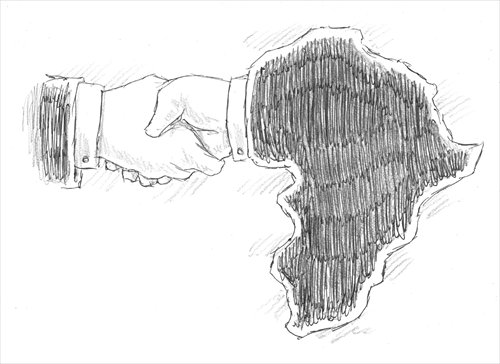HOME >> BUSINESS
China’s private sector should play bigger role in Africa
Source:Global Times Published: 2016/6/13 0:03:01

Illustration: Peter C. Espina/GT
It's an undeniable fact that China has been contributing to Africa's economy in a way that the former Western colonial powers failed to do for 400 years, with investment mostly from China's State entities helping to address the continent's poor infrastructure, a key obstacle to local economic development.
Nevertheless, it is also worth noting that the major force behind closer economic ties between China and African countries has thus far been China's State-owned enterprises (SOEs) expanding into African markets. China's private sector has yet to play an active role in boosting bilateral trade and investment in comparison, which is actually partly to blame for some of the setbacks China has encountered in investing in Africa.
For there to be fewer uncertainties facing China's investment in Africa, China's private businesses should eye a bigger role in African markets.
In an indication of the still-fragile infrastructure in the African continent, if you want to go from an African country to the next African country, especially from the north to the west, you are better off flying to Europe and then to the African country you want to get to, even if it is just across your border.
In Africa, we have a saying. In South Africa where there are proper roads, if you drive in an uneven pattern on the road, we know that you're drunk; however, in other African countries, maybe most of them, if you drive in a straight line, we know you are drunk, because there will be potholes. A five kilometer road can take you a day to get across.
In a continent of almost 1.4 billion people, the infrastructure challenges make it impossible to export countries' natural mineral resources. So the biggest challenge for Africa is internal trade. But unlike China, where SOEs can be an engine of the economy, African countries that have tried to establish state-owned enterprises have largely failed, for various reasons, such as corruption, a lack of capacity in management and a lack of finance to invest.
The former Western colonial powers, therefore, should feel embarrassed that they haven't helped in developing the continent's economy. They never considered developing a strong middle class in these countries. Without a strong middle class, these African countries will not be able to generate taxes, which are needed for them to stop relying on aid.
China has made its contribution not only by helping with infrastructure, but also with issues of hunger, healthcare and education. China also demonstrated its sincerity and ability to help with the recent Ebola situation. Even when the Americans came, they were dwarfed by what China was able to do.
However, there is still a missing link: China hasn't made enough efforts in partnering with local African businessmen. China's investment in Africa has been mostly driven by SOEs, which are used to working with the government. As a consequence, India is now the next competitor to China in the continent, because unlike China, India's private sector has a heftier engagement with their fellow African businessmen.
As more African enterprises become stronger, Chinese investment in the continent will be safer, as political powers cannot survive without getting support from local businessmen.
Some of the trouble China's State entities have faced over the years is mainly because they have a relationship with the sitting president, while the next sitting president would likely be against them.
But if China's private sector would think seriously about forging partnerships with their African counterparts, it would be a different scenario. Chinese investors partnering with local businessmen would be seen as not taking all the profits out of Africa. Additionally, local businessmen would also lobby against politically motivated hostile attitudes to protect their own business, and that would help in protecting the businesses of their Chinese partners.
The best time to be in Africa is when it still has challenges, so when the elephant rises, it must rise with you on top of it; that is what business entrepreneurship is all about.
It is advisable that China's private businesses should go in a way that no ordinary man would want to go, so they can benefit from first mover advantages.
The article was compiled by Global Times reporter Li Qiaoyi based on a recent interview in Beijing with Robert Matana Gumede, founder and executive chairman of the Guma Group, a Pan-African multi-disciplinary investment firm. bizopinion@globaltimes.com.cn
Posted in: Expert assessment, Eye on The Economy